People
Which Emerging Artist Dominated 2019? 12 Art-World Players Share Their Thoughts
Which artists commanded the spotlight in 2019?
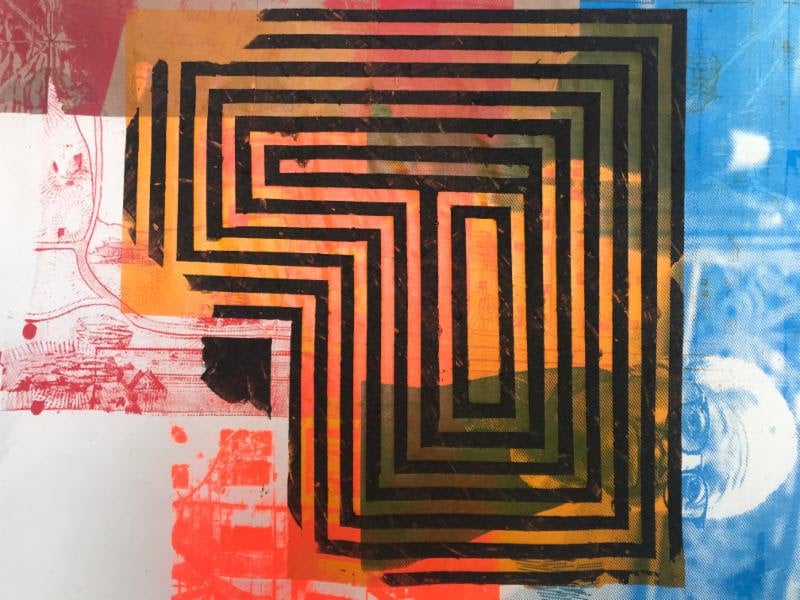
Which artists commanded the spotlight in 2019?

Artnet News

There is never any shortage of cutting-edge work by rising art stars to get your fill of, and this year was no exception. With so much material to wade through, we asked curators and other art experts to tell us which names dominated 2019 and are worth keeping an eye on as we head into the new year. Below, 12 experts share their thoughts.
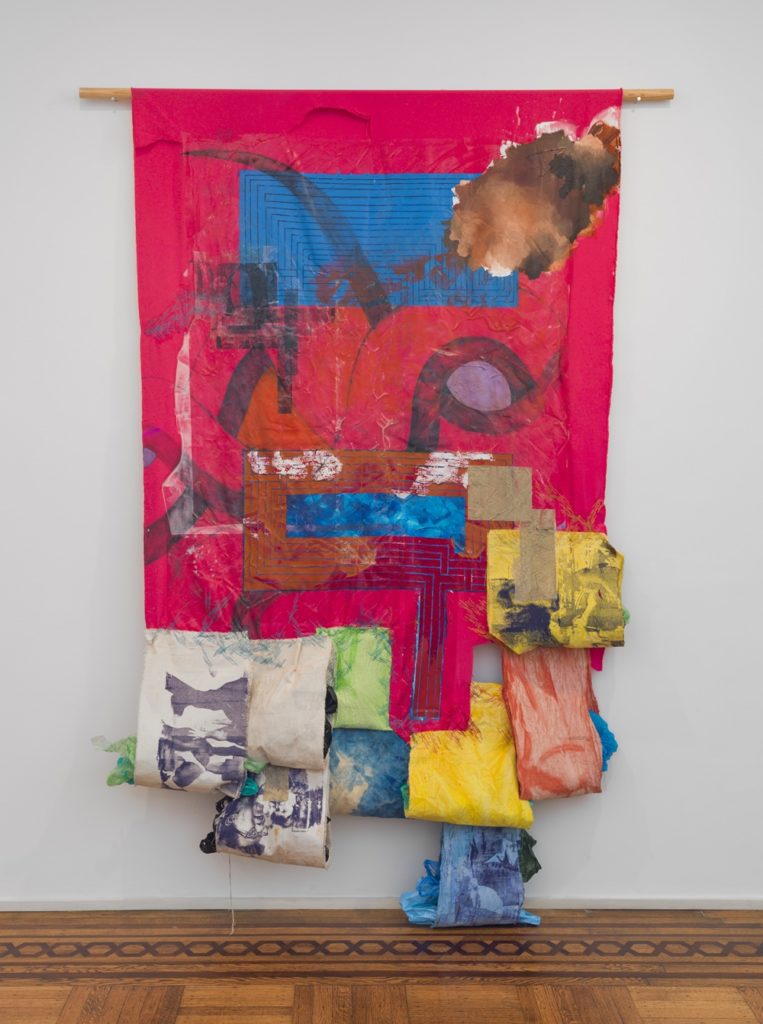
Tomashi Jackson, Dajerria All Alone (Bolling v Sharpe (District of Columbia))(McKinney Pool Party) (2016). Courtesy the artist and Tilton Gallery.
Tomashi Jackson has a powerful presence as an artist and a teacher. Her participation in the 2019 Whitney Biennial drew critical praise and the attention of many new admirers, but she has been making powerful work— merging varied media, color theory, abstraction, found imagery, and historic social and political content, most recently on the subject of [the 19th-century, predominantly African American settlement] Seneca Village—for some time. She also had a successful solo exhibition at Tilton Gallery in New York and there is loads more to come in 2020, with forthcoming exhibitions at the Radcliffe Institute for Advanced Study at Harvard and at the Parrish Art Museum in Water Mill, New York.
—Abigail Ross Goodman, curator and art advisor
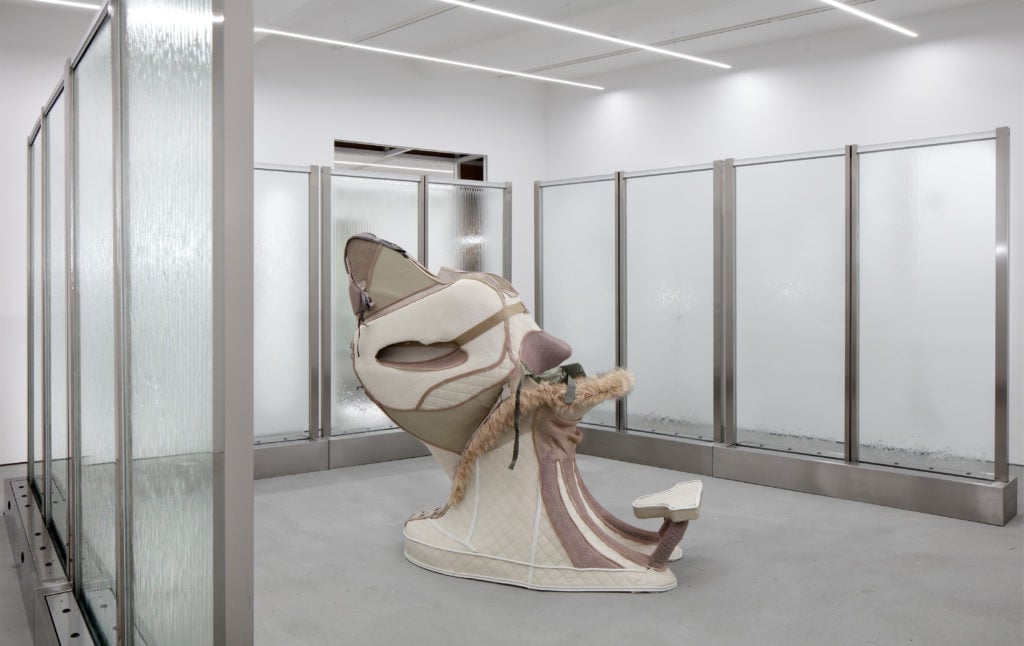
Anna Uddenberg’s Pocket Obes (2017). Courtesy the artist and Kraupa-Tuskany Zeidler, Berlin. Photographer: Gunter Lepkowski.
I encountered Anna Uddenberg’s work at the 9th Berlin Biennale and then in a solo show at Kraupa-Tuskany Zeidler in 2017. The overstretched figures in her sculptures integrate earlier approaches to gender theory while reflecting on the very timely topics of self-optimization, fitness, and self-presentation in times of social media, it-girls, and influencers. Based on Judith Butler’s idea of performing gender as a rehearsed act, Uddenberg’s work continues to confront feminine identity in consumer culture and to explore performativity by using sculpture and performance as visual platforms. Her unique work is a disturbing and yet revealing analysis of today’s gender topics and existing normalities.
—Maike Cruse, director of Gallery Weekend Berlin.
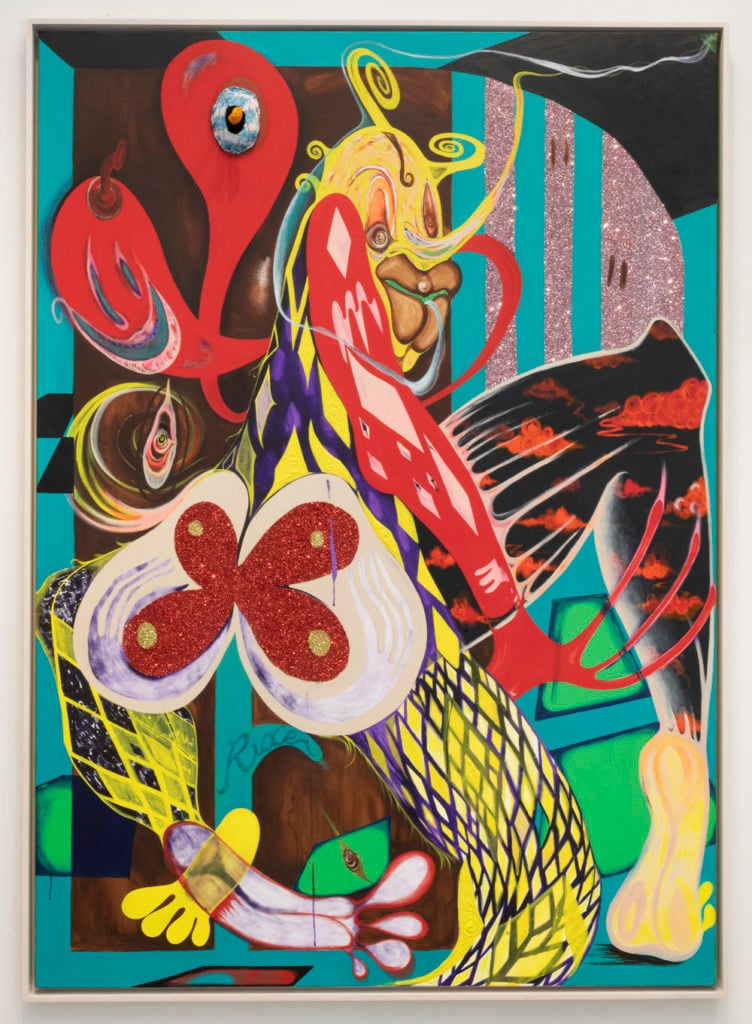
Theresa Chromati, We All Look Back At it (morning ride), 2019. Courtesy of Kravets Wehby Gallery.
I’ve loved seeing the growth and appreciation of Theresa Chromati and her work this year, especially as she was part of my STONELEAF RETREAT residency program in Kingston, New York, last year. Theresa feels like an artist of her generation—smart, stylish, outspoken, and is mastering her own unapologetic visual language riddled with fragments of self-representation, layers of emotion, and surreal symbols of sex and power. She had a beautiful solo show at Kravets Wehby in New York, and both Nina Chanel Abney and Mickalene Thomas have curated her works into impactful group shows, which is a testament to her continued success.
—Helen Toomer, cofounder of STONELEAF RETREAT and re:source
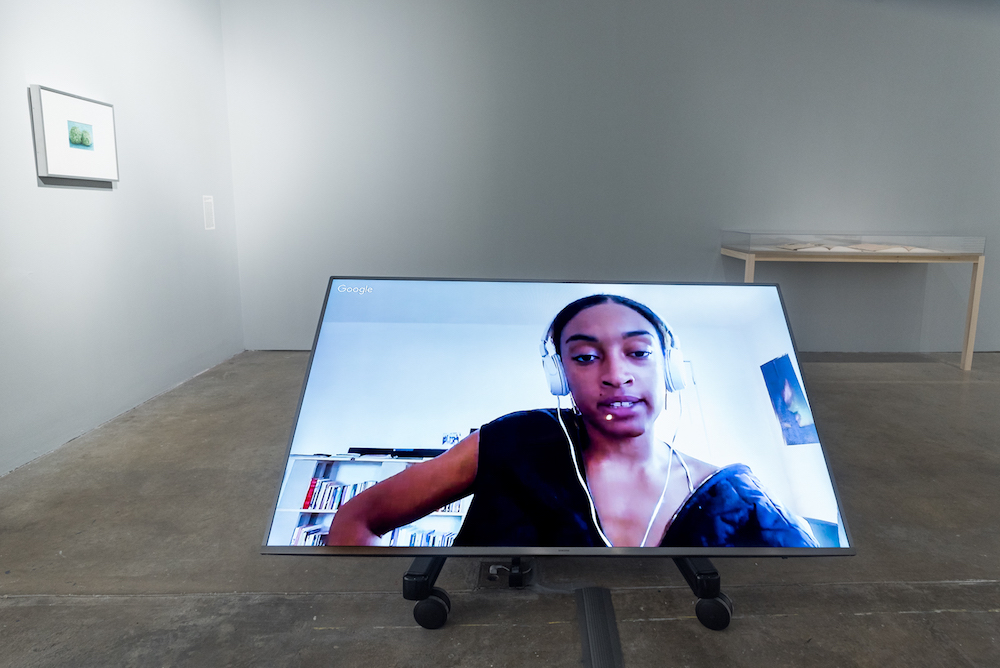
Aria Dean, Notes on Blaccelerationism (2017). Installation view in “Colored People Time: Mundane Futures” at the Institute of Contemporary Art, University of Pennsylvania. Image courtesy of the artist and Château Shatto, Los Angeles.
In my mind, Aria Dean’s formidable talent finally came to light in 2019. When the year started, she was finishing up her very first solo institutional show at Albright-Knox Gallery, displaying her three major videos to date. Since then, her work has been on view at museums and institutions continuously all year long and traveled extensively across the US, Europe, and Asia. These included: “On Refusal: Representation and Resistance in Contemporary American Art” at the MAC Belfast; “Phantom Plane, Cyberpunk in the Year of the Future” at Tai Kwun, Hong Kong; and “Great Force” at the Institute for Contemporary Art at Virginia Commonwealth University, as well as at the International Film Festival in Rotterdam. She also presented an original theatrical production titled Production for a Circle, at Centre d’Art Contemporain, Genève. Excitingly, this year, her work was acquired by the Studio Museum in Harlem and multiple works were designated as promised gifts to the Hammer Museum in Los Angeles. Château Shatto presented a solo booth of Dean’s work at Art Basel Hong Kong in March 2019, followed promptly by an exhibition at Chapter in New York, which was written up by Roberta Smith in the New York Times.
As for artists I suspect we’ll be talking about this time next year, I’m very excited by Rebecca Ness, Antonia Showering, and Lauren Quin. Yes: all female painters.
—Florie Hutchinson, arts consultant
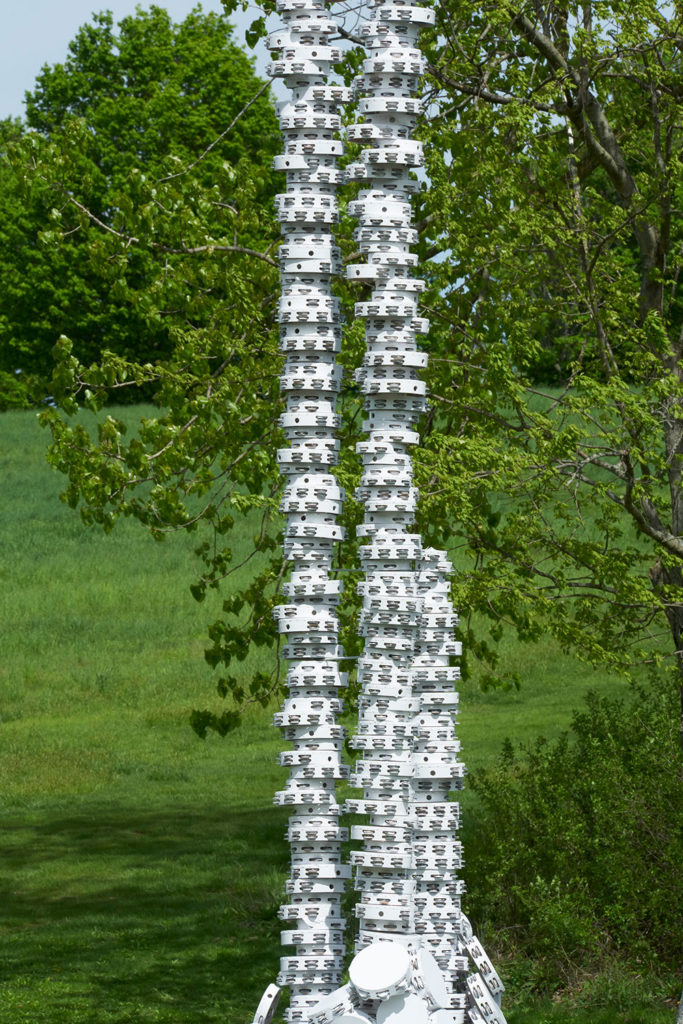
Installation view of Allison Janae Hamilton’s The peo-ple cried mer-cy in the storm, (2018). Courtesy of Storm King Art Center.
I was lucky enough to get to know artist Allison Janae Hamilton when she made a beautiful, resonant sculpture, (The peo-ple cried mer-cy in the storm), for Storm King Art Center’s recent exhibition Indicators: Artists on Climate Change. In 2019, she continued to thrive, finishing her residency at the Studio Museum in Harlem in March and following it with the exhibition MOOD (with Tschabalala Self and Sable Elyse Smith) at MoMA PS1. She had a two-person show at Marianne Boesky Gallery in Aspen, curated by artist Sanford Biggers, and joined the collection of the Menil Foundation, the Studio Museum, the Hood Museum, and the Hessel Foundation. The works she showed at Marianne Boesky Gallery’s booth at Art Basel Miami Beach—a series of adorned fencing masks—were breathtaking, and connect to her explorations of the culture, climate, and history of the rural south in both film and sculpture.
—Nora Lawrence, senior curator at Storm King Art Center
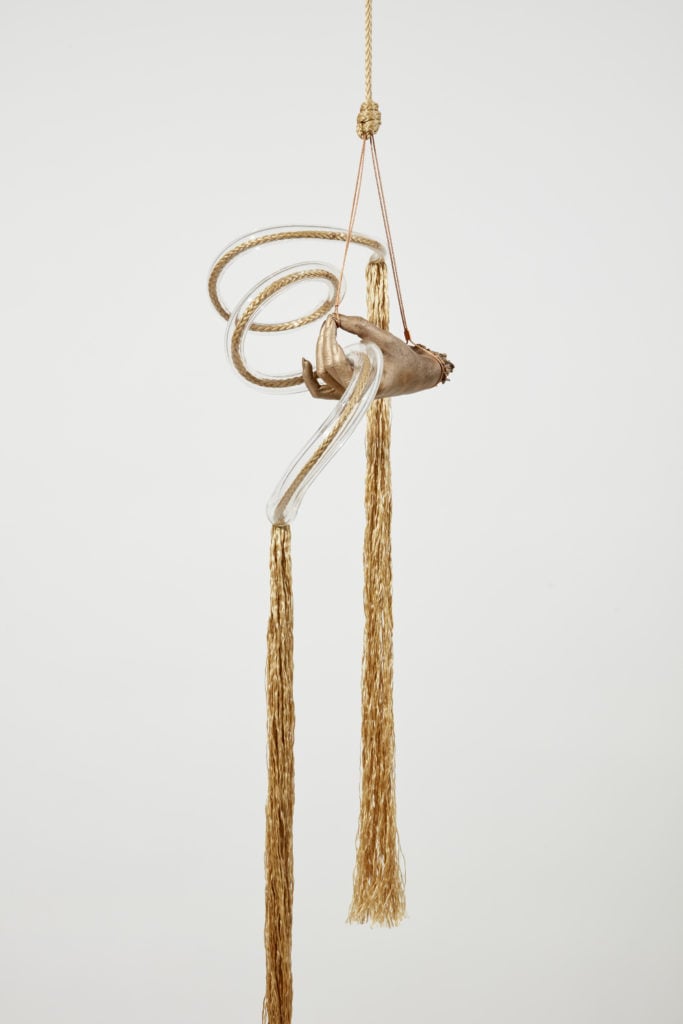
Kelly Akashi, Flowing Figure (Hooked) (detail) (2019). Courtesy of the artist, Tanya Bonakdar Gallery, New York and François Ghebaly Gallery, Los Angeles.
With her materially dynamic and elegiac exhibition last year at François Ghebaly in Los Angeles and three residencies—at ARCH Athens, the Ojai Institute, and Headlands Center for the Arts—LA-based artist Kelly Akashi had a busy and exciting year in 2019. Her practice, which is both conceptually rigorous and seductively handmade, considers enduring themes which feel especially resonant in this moment: entropy, deterioration, and the capacity and fragility of the natural environment and the human form. The year ahead includes various notable exhibition projects, including Kelly’s first solo gallery show in New York (opening in February at Tanya Bonakdar), a project at the Aspen Art Museum (opening in March), and a new outdoor commission at the Clark Art Institute in Williamstown, Massachusetts (opening this summer), all of which will no doubt catalyze new developments in her work and her audience.
—Molly Epstein, curator and art advisor
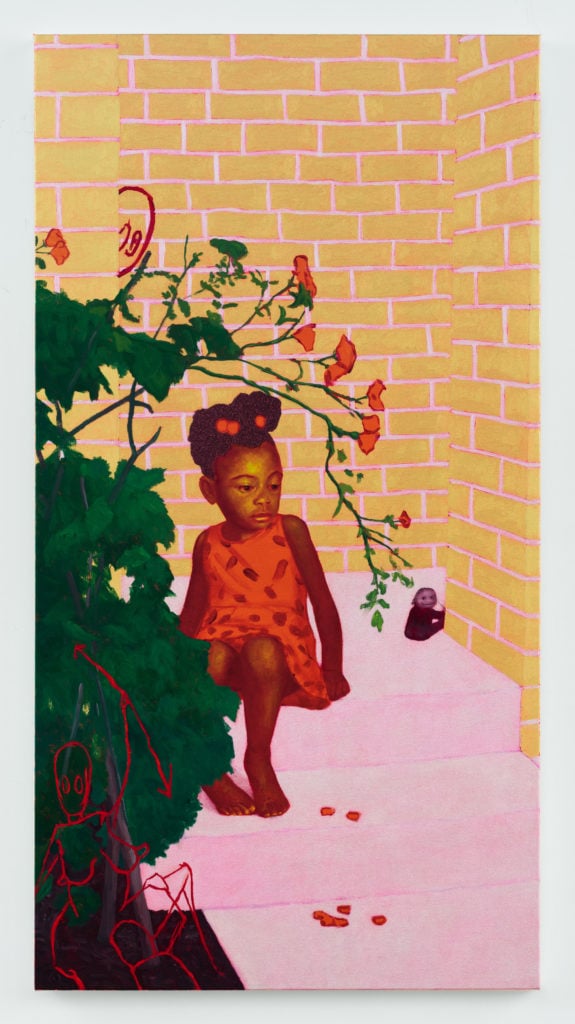
Arcmanoro Niles, When You Give Your Love Away, 2018. Courtesy the artist and Rachel Uffner Gallery.
The first time I sat with Arcmanoro Niles’s work was leading up to the 2018 Dallas Art Fair. There was a studio-visit feature with him in Patron Magazine that I remember seeing, and I was captivated by his painting process. He’s proving his staying power by the number of museums snapping up his work. The Dallas Museum of Art bought one of his paintings at the fair in April through our acquisition fund, and he’d been part of the Bronx Museum’s star-studded Benefit Auction only a few days before.
—Kelly Cornell, director, Dallas Art Fair
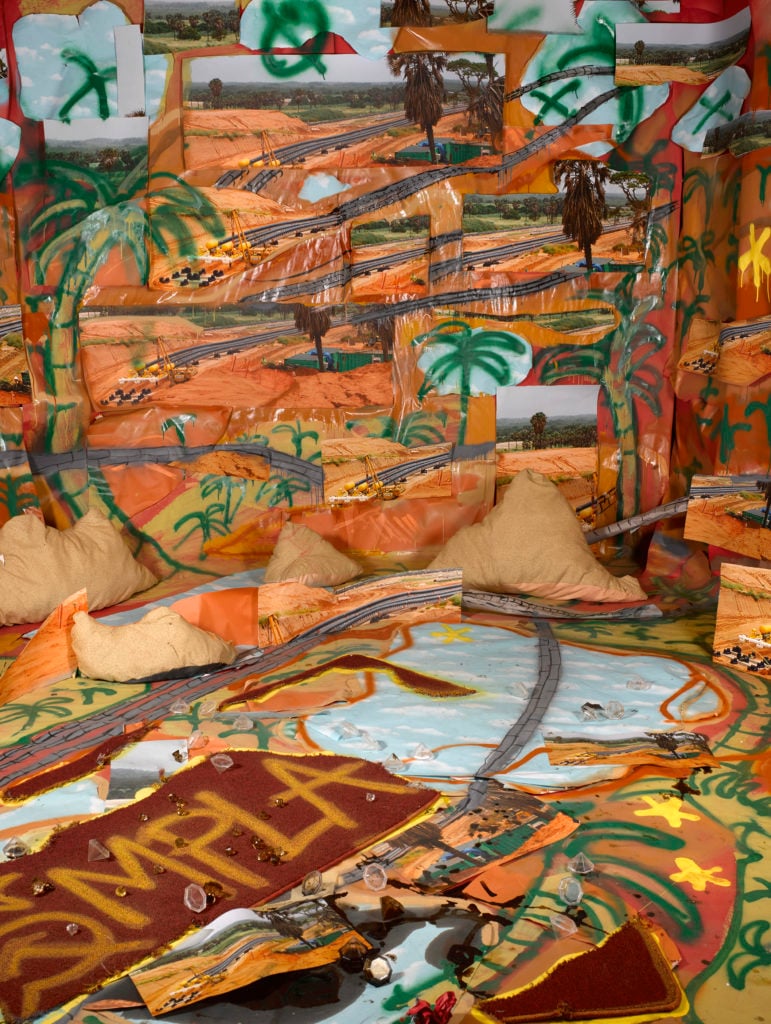
Sheida Soleimani, Dalia Oil Field, Angola (2019). Courtesy Edel Assanti Gallery.
Sheida Soleimani has been on my radar for over 10 years, from when she was a young BFA student at the University of Cincinnati. I recently had the honor of working with her for the latest FotoFocus Biennial, where she presented her powerfully staged photographs that tackle global political crises, especially in her parents’ origin country of Iran. I’m proud to celebrate the artists of our region and their successes, which for Sheida have extended from Cincinnati to London, Brussels, and Cologne.
—Mary Ellen Goeke, executive director, Fotofocus Biennial
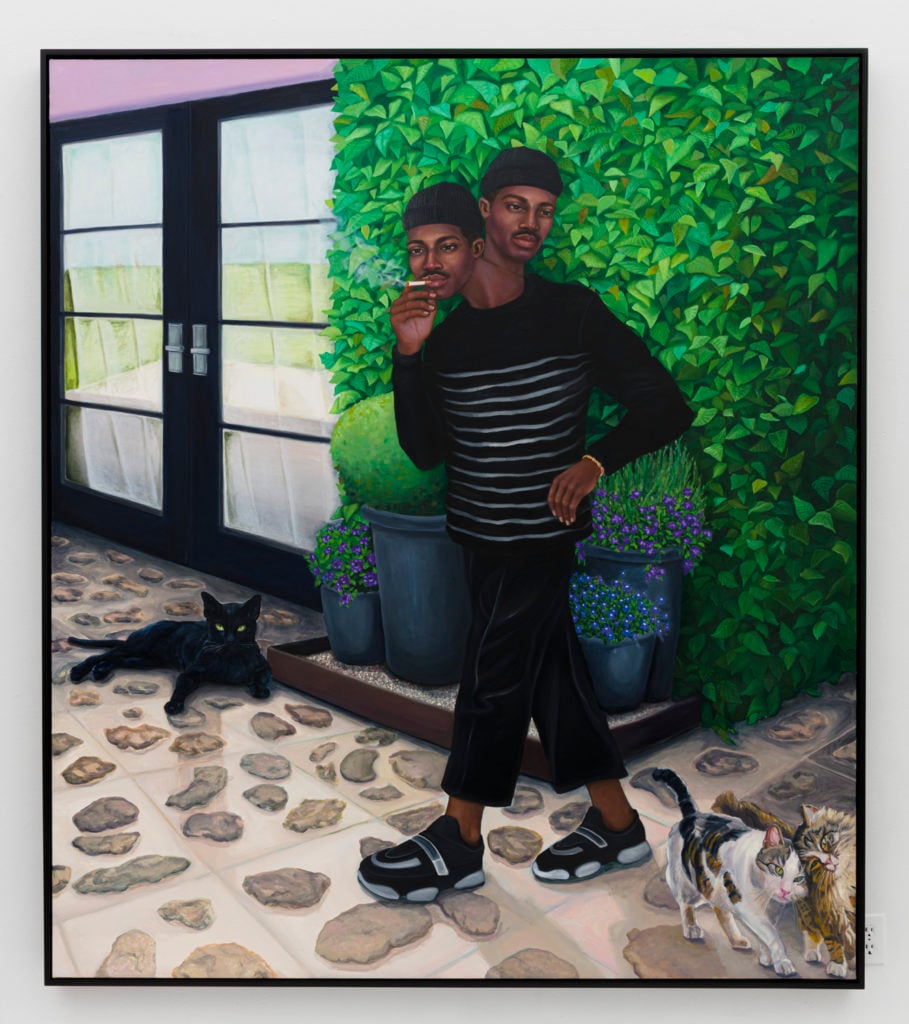
Vaughn Spann, Black Catz, (2019). Photo by Jeff McLane. Courtesy of UTA Artist Space.
Vaughn Spann is a brilliant painter and storyteller. His work explores themes of blackness that are both abstract thoughts and monumental movements, and he beautifully captures the duality that exists in each of us. I first encountered his work at a new gallery in Los Angeles called Residency Art. I was left breathless by the beautiful landscapes and spectacular universe depicted around the human figure. Vaughn’s practice continues to evolve, yet he has created a body of work that is instantly recognizable. I am proud to show his work in our “Disembodiment” exhibition so the Los Angeles art community can engage with the captivating world he has created.
—Arthur Lewis, creative director, UTA Fine Arts and UTA Artist Space
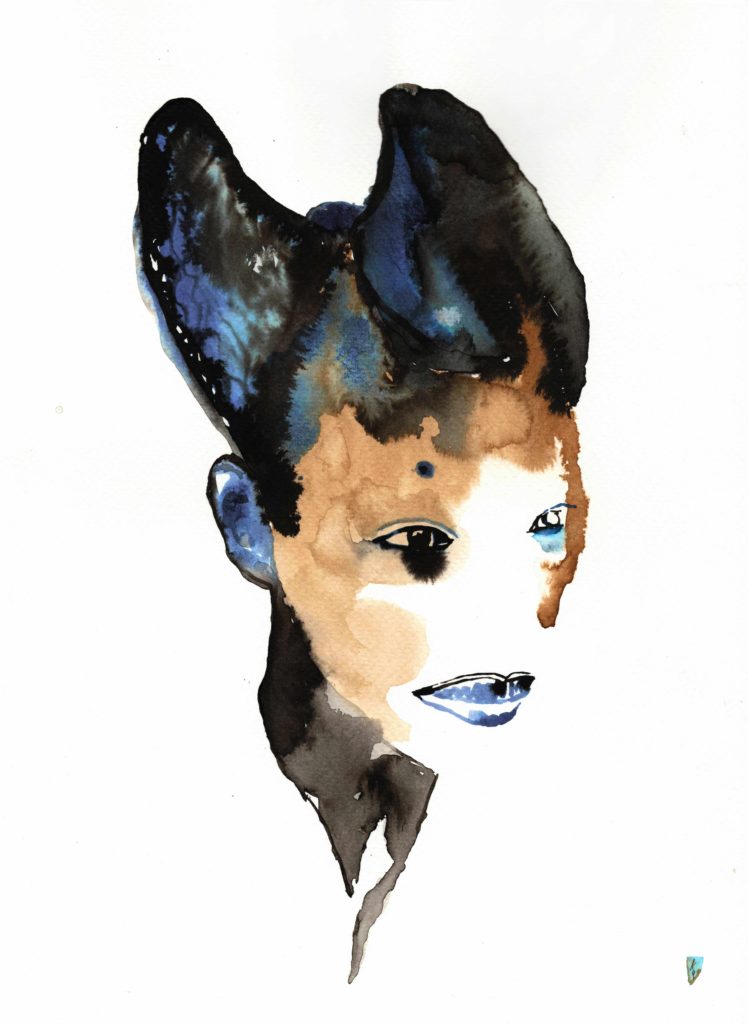
Kambui Olujimi, Fresh Cuts No. 6 (2019). Courtesy Kambui Olujimi and Absolut Art.
I started to really pay attention to Kambui Olujimi this summer when our collaborator Kehinde Wiley announced Kambui had been accepted into the first group of artists in the Black Rock Senegal residency program. It was about the same time that he signed on to our Wu-Tang print collection and I got to know him personally. He’s experimental, engages with socially critical content, and keeps switching up mediums to tackle issues of race and politics in new, inventive ways.
—Nahema Mehta, CEO, Absolut Art

Lily Cox-Richard, installation view of She-Wolf (2019) and Ramp (2019). Photo by Colin Doyle. Courtesy of the Blanton Museum of Art.
I became aware of Lily Cox-Richard’s sculpture in 2016, when she had solo shows at Artpace in San Antonio and She Works Flexible in Houston; I appreciated her work’s wit and attention to detail, but above all, its rigorous engagement with the histories of sculpture and materials. Her new work for the Blanton’s Contemporary Project responds to the museum’s collection of plaster casts of classical sculpture, using 3D scanning and an ancient faux-marble technique to prompt critical thinking about whiteness. As artists and curators continue to interrogate the canon, Lily’s incisive material investigations, which will be the subject of a MASS MoCA show in 2021, will continue to resonate.
—Claire Howard, assistant curator, Blanton Museum of Art
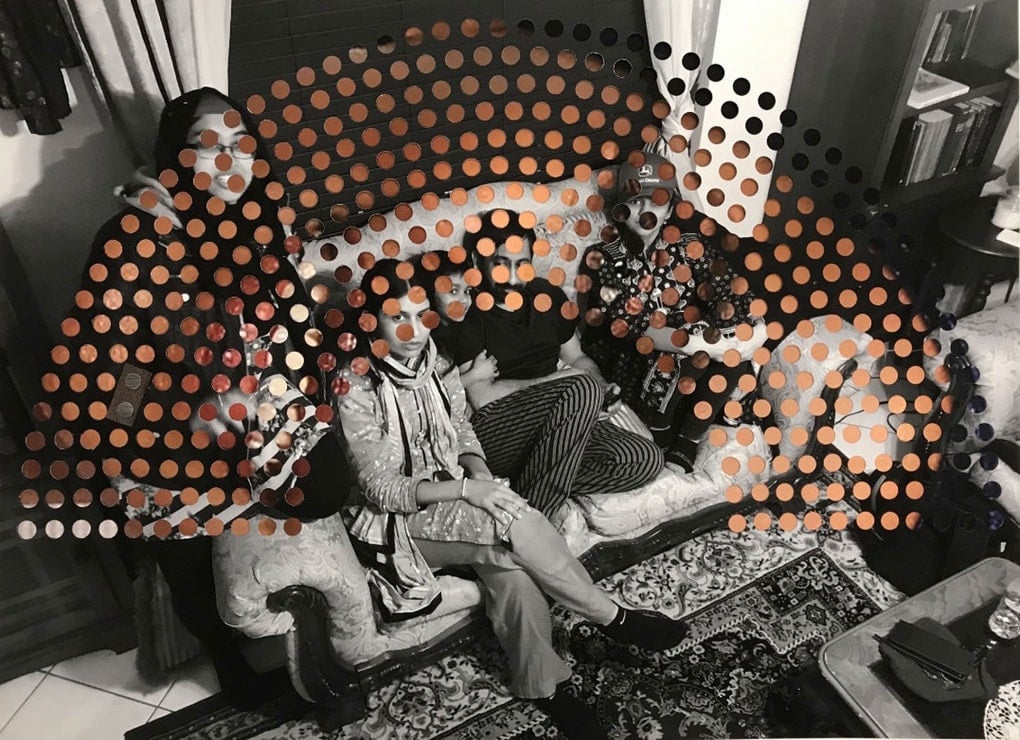
Baseera Khan, My Family Seated (2019). Courtesy Baseera Khan and BRIC.
I was introduced to Baseera Khan’s work this fall in the process of organizing a major exhibition at BRIC, “Beyond Geographies: Contemporary Art and Muslim Experience.” She incorporates both consumer objects and culturally significant forms in her work, ranging from customized Nike Air Force 1s to prayer blankets and traditional fabrics, to engage with intersectionality and identity politics in a way that feels fresh and relevant to current conversations on race, religion, and identity. She had a big 2019, as her work was exhibited at the Studio Museum and the Ford Foundation Gallery, and she is now closing out the year with a remarkable solo show at Simone Subal Gallery. She also received both a Joan Mitchell Foundation award and the Colene Brown Art Prize this year. I am certain her work will continue to communicate personal experiences that, in their truth, are universally understood.
—Kristina Newman-Scott, president, BRIC